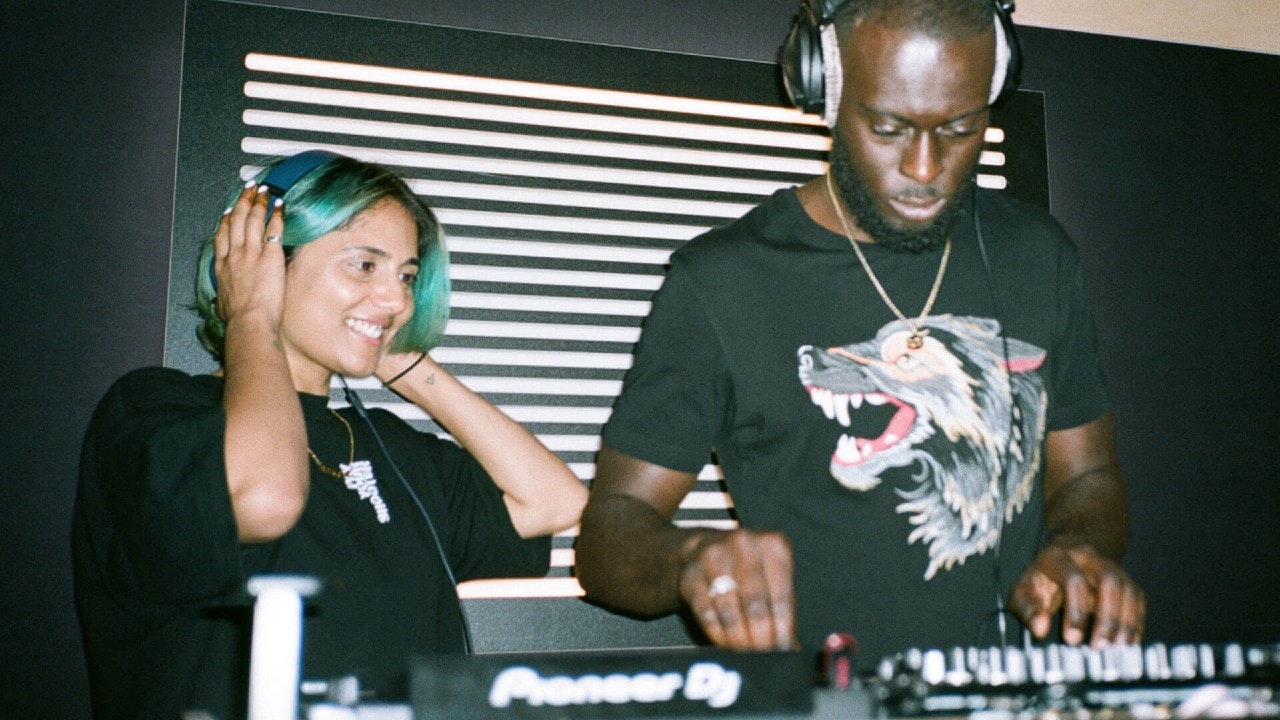
■ Features
Want to learn how to DJ, but not sure where to start? What it means to be a DJ can differ widely depending on whether they are a professional or hobby DJ, what environment they work in, what type of music they play, and what equipment they use.
To help you make the right choices as you start your DJ career, we’ve compiled the ultimate guide to DJing for beginners, covering everything from equipment and mixing techniques to career options and building your brand. If you want to learn how to DJ online and pick up some DJ tips for beginners, this guide is a great place to start.
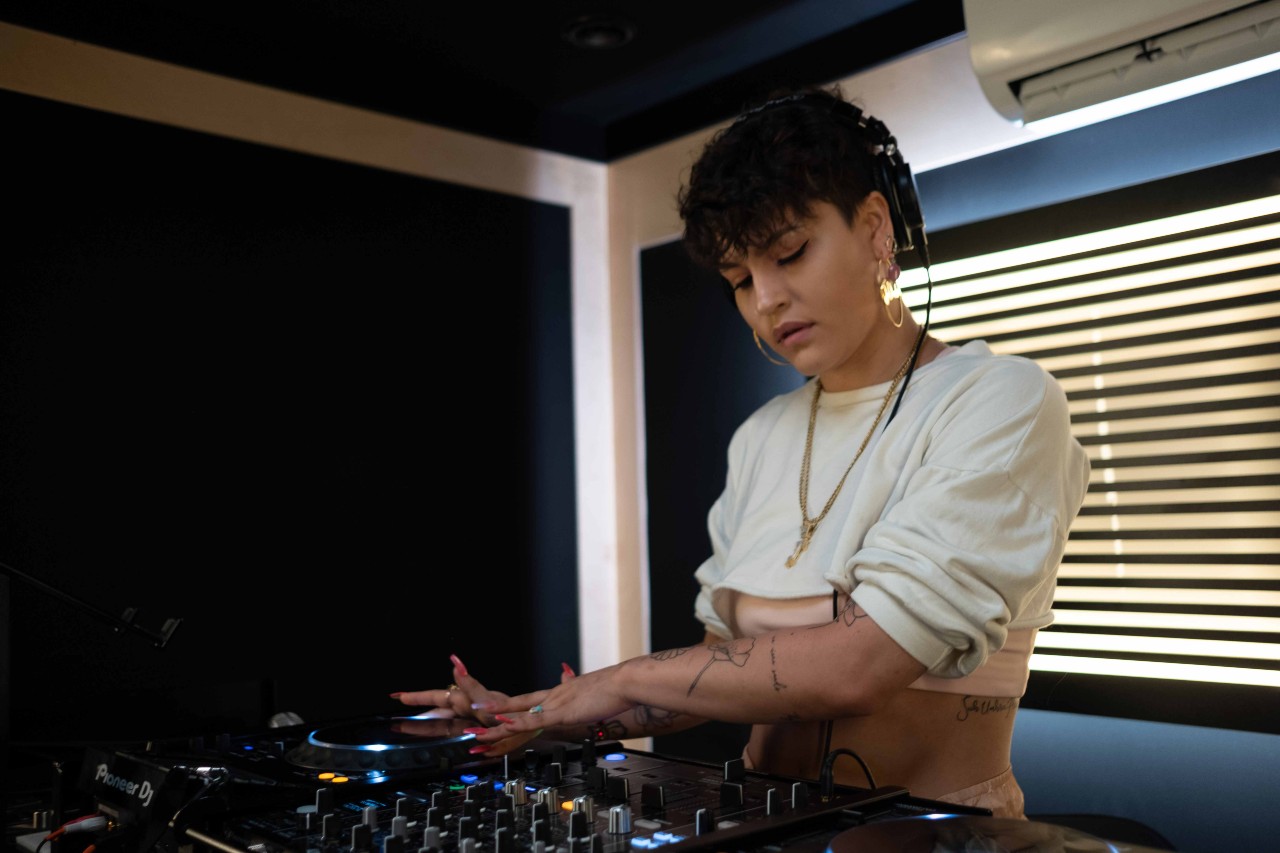
DJing as we know it today has its roots in radio, which rose to popularity back in the 1920s, and the term DJ (Disc Jockey) was coined in the 1940s. In the 1950s, the concept of the DJ or selector as the focus of the party emerged, with nightclubs and discothèques growing in popularity in Europe and the US during the 1960s, and DJ Francis Grasso became the first DJ to beatmatch in 1969.
Fast forward to the 1980s when house music appeared in Chicago, pioneered by the likes of Frankie Knuckles, Larry Heard and Ron Hardy. Meanwhile, the Detroit techno sound was being developed by the Belleville Three, aka Juan Atkins, Derrick May and Kevin Saunderson. In 1994, people were already talking about ‘The Cult of the DJ’ and Andrew Ross referred to the dance club as "one of the most important cultural institutions of the last two decades."
From then on, electronic dance music continued to diversify and increase in popularity, with countless new genres emerging and more and more DJs and clubs becoming world-famous.
Over the last couple of decades, technological advances made it easier to become a DJ. In 2007, Pioneer released the CDJ-400, the first CDJ with a USB input. DJ controllers, used together with a DJ software on a computer, were also becoming popular – the release of the Vestax VCI-100 in 2006 is often hailed as the turning point that shifted digital DJing into the mainstream. More portable and more affordable than a full set up, controllers made mixing more accessible to the hobby- or bedroom DJ.
Technology continues to advance, and the electronic music industry continues to grow, with more and more aspiring DJs training their skills and starting their careers. Diversity in the industry is also slowly becoming more important, making the profession more accessible to more people, although there is still more work to be done. Today, DJing has become a popular global profession and hobby, especially in cities with a strong electronic music culture, such as Berlin, New York, or London.
The term DJ covers a broad range of professions and activities, including club DJs, radio DJs, wedding DJs, bedroom DJs, and more. Below is an overview of some common types of DJs, the skills they need and their potential income levels.
The most common types are:
Club DJs are probably the most well-known type of DJ. How quickly you can get a gig as a DJ in a club will depend a lot on luck and connections, but a few months of solid practice on club-standard equipment and some consistent digging should be enough to get you up to scratch for your first gig. However, if want to start a club DJ career properly, you can continue to hone your craft to a high level for years – or even a whole lifetime!
Important skills for a club DJ are selection, beatmatching and mixing, and the ability to read the crowd and manage the energy on the dancefloor. The expected income for a nightclub DJ varies depending on location and experience level. Some DJs play for as little as free drinks, while others earn upwards of $2k for one gig. Most club DJs freelance, although it is also possible to get a residency at a local club.
Radio is where it all started, and whilst it’s perhaps no longer as glamorous a career as before, the radio DJ can still be an important and popular profession. Radio DJs might have to talk about music news or interview musicians, combining their DJ skills with journalism and presenting. To become a radio DJ, you might not need to know how to beatmatch, but you should be familiar with studio equipment and microphones, know your music well, and keep up to date with new artists and releases.
Salaries for radio DJs can be quite low for entry-level positions, depending on location or radio station, and much higher for well-known radio personalities. There are also many community radio stations that offer a platform to share your music with the world with a low barrier to entry, usually unpaid.
A mobile DJ career will see you play at private events, including weddings, birthdays, ceremonies and more. Mobile DJs usually bring their own equipment as part of the deal, so a little bit of technical knowledge is necessary, and they are often open-format or cross-genre DJs, adjusting their selections to the wishes of their client or even taking requests from guests on the night.
Mobile and wedding DJs need to be adaptable and friendly and might even need to double as an announcer or MC for the event. Mixing skills and digging for music are less important than for a club DJ, but you will still need a broad collection of music, which has become even easier in recent times with modern DJ streaming services. At the entry level, mobile DJs often earn more than club DJs.
These DJs use two or more turntables and a mixer, making heavy use of the crossfader, scratching, backspins and cueing to manipulate sounds in a unique way – essentially using the turntable as a musical instrument. This style of DJing is very focused on skills and it can take a while to learn how to scratch.
Turntablism has its roots in the hip hop scene but can be used for many different genres of music. Because it’s a slightly more niche scene than that of the club DJ, it might be difficult to make a decent income as a turntablist, though it is surely possible.
Bedroom DJs are amateur DJs who play at home, perhaps recording mixes to upload to SoundCloud or MixCloud or even live streaming their sets on Twitch. This is a great way to work on building your brand online while learning how to DJ and before starting to play at venues, no matter your skill level. Of course, it’s difficult to earn money as a bedroom DJ, unless you are very successful on YouTube or another platform.
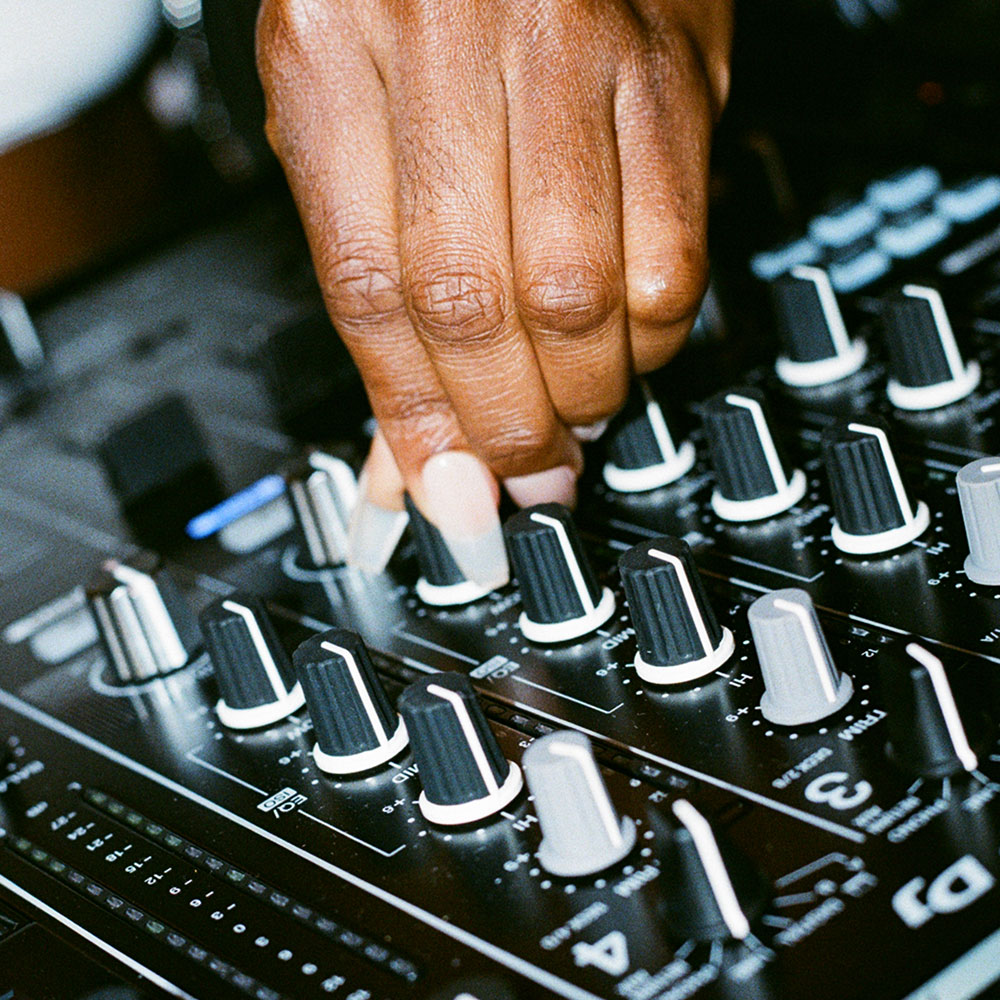
DJing and music production are often confused, and many DJs will also produce at some point of their career, and vice versa. In short, music production is creating or recording music, while DJing is the art of mixing pre-recorded music together. Many producers also perform their own music live using synths, pads, and other equipment. Some producers might not DJ at all. Some DJs might include samples or use pedal effects in their sets, or even perform hybrid live sets, blurring the line between the two.
While learning how to get started with DJing, it might help to know which qualities can help make a good DJ:
Passion: One of the most important traits of a DJ is their love of music! The passion that keeps you searching for new tunes and the joy you feel when sharing them with an audience is one of the best things about the job. When a DJ plays music that they love, these positive vibes also translate to the audience and everyone has a better time!
Motivation and organisation: As a DJ you will usually be working for yourself or freelancing, which means doing your own bookwork. Unless you join an agency, you will have to communicate with venues, arrange gigs and negotiate fees. Motivation, good organisation, and communication skills will help you here.
People and networking skills: These will help you get gigs and advance your career. Especially in a market with so many DJs, you will need to leave a good impression with the promoters, club managers and other DJs, to ensure you will be invited back.
Technical ability: Although it’s not necessary to be an expert before you start DJing, understanding how your equipment works and how club sound systems work will make you a better DJ – enabling you to troubleshoot issues as they arise or adjust your mixing style to the room you’re playing in.
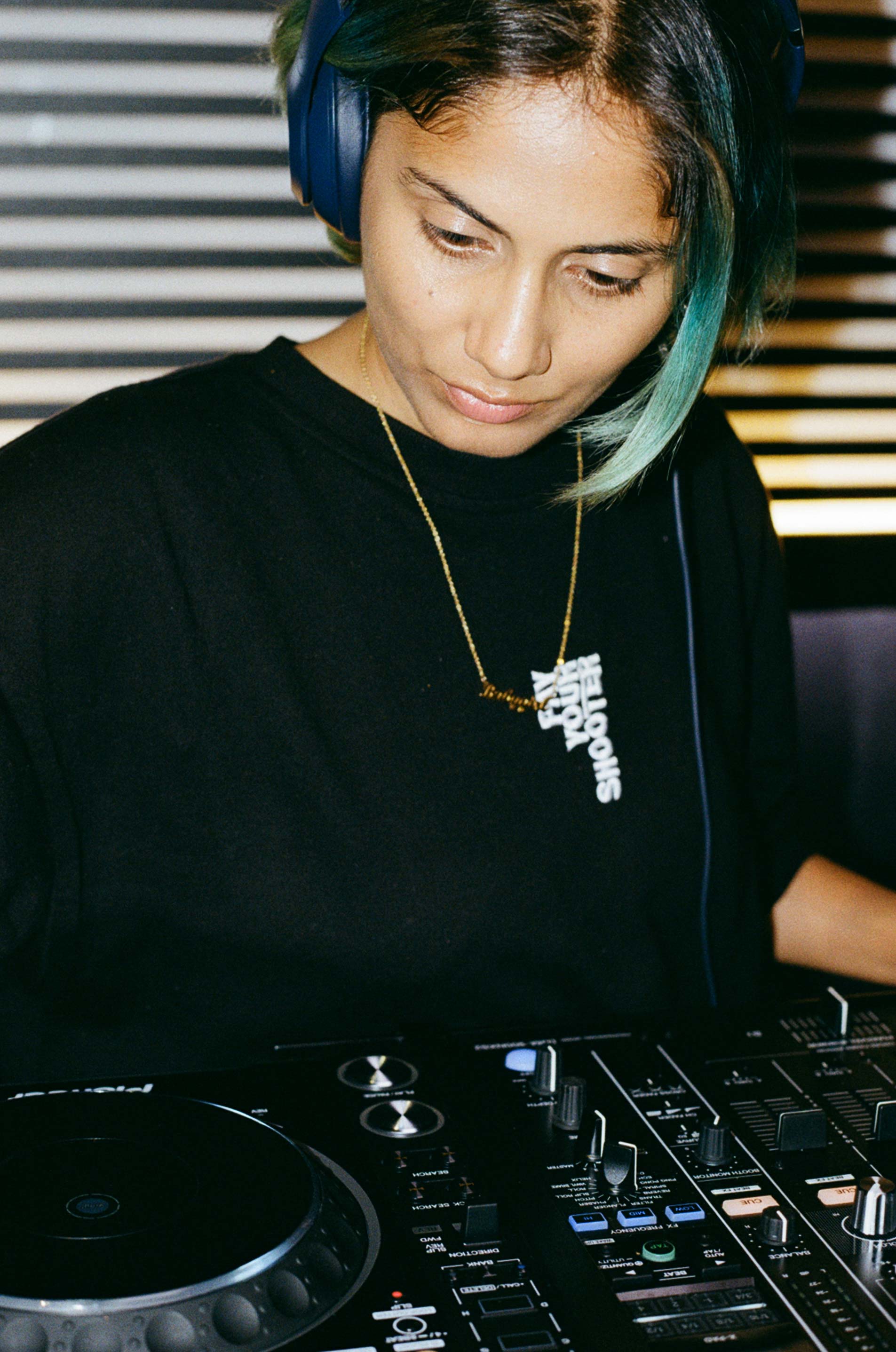
While learning to DJ, you might want to consider what your goals are. As discussed above, there are many different types of DJs, so what level do you want to get to? What will your musical focus be? Will you be a vinyl or digital DJ, or both?
Do you aim to earn some or all of your income by DJing, or are you happy as a bedroom DJ, playing and collecting music for fun, perhaps playing at the odd house party. Do you aspire to become a famous, touring DJ and perhaps ultimately producer or would you be satisfied as a staple of your local scene, perhaps hosting a small monthly party?
This will depend a lot on your own taste, but you can also decide how to brand yourself and your sound. Many DJs will specialise in one or a few genres or sub-genres, for example techno, house, disco, or drum and bass. Your choice of genre might also depend on where you are located, as different genres are popular in different cities. For example, psytrance is very popular in Israel, whereas if you live in London, you might be more successful playing UK Garage. On the flipside, if you join an oversaturated market, you might struggle to get gigs, so it might also be strategic to carve a niche out for yourself.
Obviously, you don’t have to choose one or the other, but as you’re learning to DJ you might need to choose which setup to start with. Vinyl DJing can be much more expensive, mostly because vinyl is so expensive – although digital equipment can be even pricier if you opt for club standard CDJs and mixer.
Whether or not you want to play vinyl might also depend on the style of music you play – some genres have a lot of vinyl-only releases, others mostly digital. You might prefer mixing the latest digital releases or crate digging old vinyl from the 90s – it’s up to you! The skills associated with mixing vinyl might take a little longer to learn but can be rewarding in the long run.
Most DJs, no matter their level of experience, are constantly learning and improving. It shouldn’t take long to learn how to beatmatch on CDJs or how to mix with a DJ software. You can even learn how to DJ on a laptop in 5 mins.
Äggi Blu, a DJ from Berlin, says
"The essence of DJing is curating a mood with music for a specific purpose. I learned how to use a controller to mix tracks in and out in 15 minutes at a house party. Learning how to use CDJs took maybe 2-3 practice sessions after that. But learning what it means to curate tracks that are uniquely me and at the same time serving someone else’s purpose is a lifelong art I am so happy to work on forever."
If you’re lucky, you might get the chance to play in front of an audience early on and practice as you go, perhaps making a few more mistakes at the beginning. Or you might spend years developing your taste, building your music collection and practising your mixing skills at home before playing your first gig. As with all things, it will depend on your level of motivation and the time you invest in developing your skills.
When thinking about how to get started DJing, you’ll need to consider carefully what is the right equipment for you: whether that be a laptop and controller or decks and a mixer. You’ll almost definitely need headphones and speakers, and the whole setup can be a big investment, depending on which equipment you choose.
DJ equipment can be expensive, so make careful decisions and choose the right equipment for your needs. Luckily, if you take care of your mixer or CDJs well, you might find that they have a relatively good resale value, should you choose to upgrade later.
If you’re planning on learning how to DJ with digital music, you’re going to need a laptop to download and organise your music before exporting it to a USB. If you want to learn DJ mixing with a DJ software and controller, you’ll need to make sure that your laptop meets the technical requirements. Most modern laptops should have enough CPU and RAM to run DJ software, although if you plan to produce at a later point, it might be worth investing in minimum 8GB RAM to ensure Ableton can run smoothly.
When you’re just starting out, you might not want to buy a club-standard set of CDJs immediately, as they can be very expensive. You should be able to pick up a second-hand pair of Pioneer CDJ-350s or 850s, or XDJ-700s, for much cheaper. Older CDJ models won’t have as many features (read: no sync button!), so the learning curve might be a little bit steeper, but they will also help you build more advanced beatmatching skills. XDJs are similar to CDJs, but without a CD player (which few DJs still use these days anyway), and a larger screen that shows you more information about your tracks. These are a great option.
If you want to start off with turntables, then it’s better to invest in a proper pair of decks straight away. DJ turntables need to be direct drive. There are options from Pioneer, Technics and other brands like Reloop or Audio Technica. You might find a pair of secondhand Technics (which are also club-standard) for a reasonable price, although you may need to get them serviced, change needles occasionally, and purchase other turntable accessories.
There are many different mixers to choose from! You will find Pioneer or Allen & Heath mixers in most clubs, although other brands like Denon are becoming more common, and rotary mixers are also popular amongst vinyl DJs. For the beginning, a two-channel mixer from Pioneer or Allen & Heath should be enough for your home set up whilst giving you the chance to practice on something similar to what you would find in a club, if that’s where you ultimately want to play. You can find out more about the options available in our guide to the best DJ mixers.
If you have a smaller budget, an entry level DJ controller might be the option for you. A basic controller will give you a similar experience to a two-channel mixer and two digital decks, just much more compact. For this option, you’ll need a laptop with DJ software, which links to your controller. This setup also has the advantage of being comparatively lightweight and portable, so you can easily take your controller and laptop to a friend’s houseparty, connect your laptop to their speakers, and start mixing!
If you have a bit more money to spend, you will also find standalone units that allow you to play with a USB or hard drive instead of a laptop. These larger units look and feel a lot more like a club setup. There are dozens of controllers on the market, so to help you make your decision, check out our guide to the best DJ controllers.
One of the first pieces of equipment you will need while learnig DJ mixing is a pair of DJ headphones, which you will use to listen while cueing and beatmatching. When you get started DJing, your normal listening headphones might be enough, but once you’re ready to play in a club environment you’re going to need more powerful ones designed for DJs.
While choosing your DJ headphones you should consider comfort, sound and noise isolation. You may use your headphones for hours on end while practicing and preparing, as well as during your gigs, so they should sit comfortably. You can choose between on-ear or over-ear headphones, depending on how much sound isolation you want. DJ headphones will often have a punchier sound to help with beatmatching in the loud club environment, as opposed to studio headphones that sound more neutral. Find out more about the best headphones for DJs in our guide.
The next thing you need is a nice set of speakers at home to practice with. Naturally, your home setup won’t (and probably shouldn’t!) rival a club system, but practicing your mixes with a Bluetooth speaker isn’t much fun either. A decent pair of active or semi-active 5-inch studio monitors are an easy starting option that won’t require an additional amplifier or subwoofer. If you’re a bit of an audiophile and you might want a more advanced setup, or you could consider renting a studio – learn more about home studio vs professional studio.
If you aspire to become a mobile DJ, you might get a more professional speaker set up, as you may want to provide full equipment rental as part of your services.
This really depends on your budget and your goals. If you aim to DJ professionally, it might be worth investing more in good equipment from the beginning. You might be lucky enough to pick up a set of second-hand CDJs and mixer for under 1000 GBP. If that seems out of reach, you can opt for a basic controller for around 150 GBP and visit professional DJ studios for practice sessions.
If you don’t yet have your own equipment, or perhaps bought your first controller, there are plenty of beginners’ DJ softwares you can use to help you learn. Most of the best DJ softwares are quite intuitive and give you the tools you need to start mixing straight away on laptop. Popular softwares, such as Traktor, rekordbox or Serato offer free versions with limited features, as well as pro versions that are purchased once off or as monthly subscriptions, depending on the features. Some controllers come with free software as a package deal. There are also other free DJ softwares available, such as Virtual DJ or DJUCED.
To get started, check our guides on:
When you’re first learning how to DJ, you only need a collection of 50-100 tracks to practise mixing. There are many online marketplaces for digital music. Some of the most popular ones are Beatport/Beatsource, Bandcamp and Traxsource. If you want to learn to DJ without spending money on music, you can often find tracks available for free download on SoundCloud or ‘pay what you want’ on Bandcamp.
Music streaming can be another great option for beginner DJs. Beatport/Beatsource streaming, Tidal and Soundcloud all have integrations with some of the major DJ software brands and can give you access to millions of tracks for a monthly subscription fee. DJ Pools like ZIPDJ or DJcity can also be great if you find yourself buying dozens of tracks each month.
While digging for music and finding your sound, these platforms and their curated playlists or algorithmic recommendations can be very useful.
"I love digging via the algorithmic god, I think nothing is a coincidence and neither is the music that pops up on your algorithms. They always gave me what I wanted and what I didn’t even know I wanted!" - Äggi Blu, Berlin DJ
Last but not least – you can always go old school and head to your local record store to dig through their bargain bin and see what gems you might find!
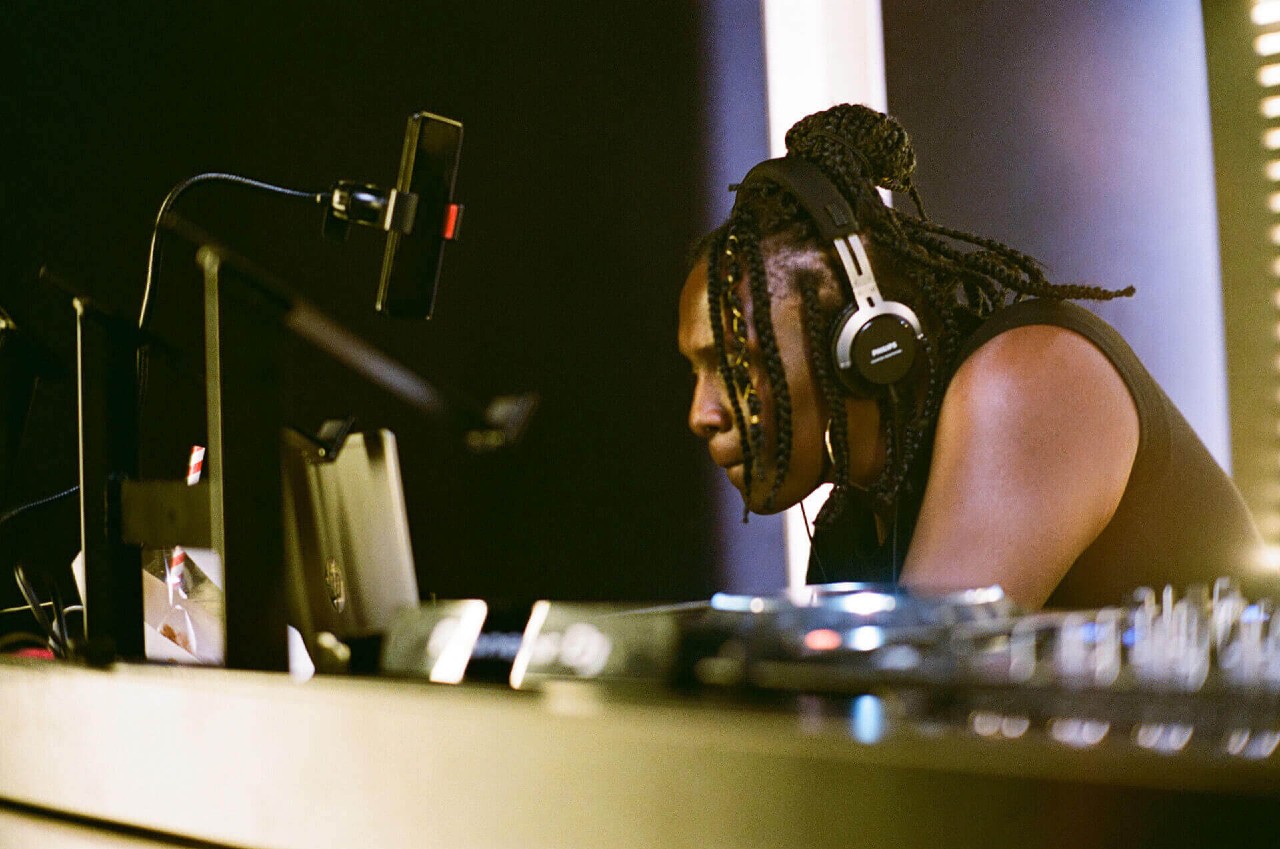
Becoming a DJ might seem intimidating, but once you have some equipment, you’ll be surprised how much you can learn just by exploring. Another great way to learn is to get together with some friends and have a mix – no matter their experience level, you’re bound to learn something new. If you’re looking for more formal learning resources, you can find online courses or tutorials, or even attend a workshop in person, if you can find one in your area.
There are several online resources available for beginner DJs, spanning from YouTube videos through to paid courses that give you a real qualification. Pioneer DJ has some tips on how to learn to DJ online, including free options. You can also look to reputable schools like Point Blank, who have both online and in-person options.
If you’re a FLINTA+ person looking to start your DJ journey, check out the Future Female Sounds DJ Academy for a comprehensive online course, or keep and eye out for local collectives hosting beginners workshops, for example Femme Bass Mafia in Berlin. These kinds of workshops will not only help you develop your knowledge and skills, but also double as an excellent networking opportunity!
Here are some basic mixing techniques you will need to master as you learn how to DJ:
Beatmatching involves firstly matching the tempo (or BPM) of the tracks you want to mix by adjusting the pitch fader, and then making sure that the tracks are in phase (i.e., the beats are aligned) by using the jog wheel. If you’re struggling with this in the beginning, you can use the sync button to help, if your equipment has that option.
Phrasing is also important to make sure that your mixes flow and that the bass drops at the right time. Most 4/4 electronic music works in phrases of 4 bars, or 16 beats. A good rule of thumb is to start counting at a break or drop (or any point in the track where something significant changes), then count 16 beats and bring in the next cued track at the beginning of the next bar. With some practice and experience you will start to feel the phrasing naturally. Using the waveform on your controller or player, if you have it, can also be a useful visual cue. This skill is important when making good DJ transitions.
Not all tracks are mastered to the same level. Especially if you are mixing older and newer tracks, or digital and vinyl, you need to understand the difference between volume and gain, and use the gain (or trim) knob to adjust the volume of incoming tracks to match that of the one that’s already playing. If you can’t hear the difference, the LED indicators on each channel can also serve as a visual aid. Just make sure you avoid going into the red because that means your sound will be distorted – and redlining is also bad for your equipment!
EQing means using an equaliser to cut or boost certain frequencies in a track. Most controllers and mixers have a 3-band EQ, with highs, mids and lows, although some mixers may only have 2 or even 4. You can use the EQ knobs to take out the bass from one track, for example, before bringing in the bass of the new one. You can learn more in our guide to EQ.
Once you have a collection of tracks and you’ve practiced beatmatching and EQing, you can start to record a mix! Recording is a great way to improve because you can listen back to it and note what you need to work on. You can also send it to friends or acquaintances for feedback! There are several ways to record a mix. Most DJ softwares have a recording capability, or if you have a mixer, you can record directly to a recording device or to your computer by using a soundcard. You can also use CAPTURE.AUDIO to record your mixes at a studio.
If you want to practice playing in front of an audience and connect with other music lovers around the world, you can start by learning how to livestream a mix. A lot of aspiring DJs like to livestream their mixes through Twitch or other online platforms. Video footage of you playing can also be useful in the long run when it comes to getting gigs! Similarly, there are lots of online platforms that post high quality videos of DJ sets, which you can watch to learn from their techniques and selection!
Practice is of course the most important factor! Seek out other DJ friends and ask them for constructive feedback, don’t be afraid to ask questions, and take the chance to mix b2b (back-to-back) with more experienced DJs whenever you have the chance, and simply watch what they are doing. Everyone has their own tricks and DJ tips for beginners, but with time you will find the combination of techniques that work best for you.
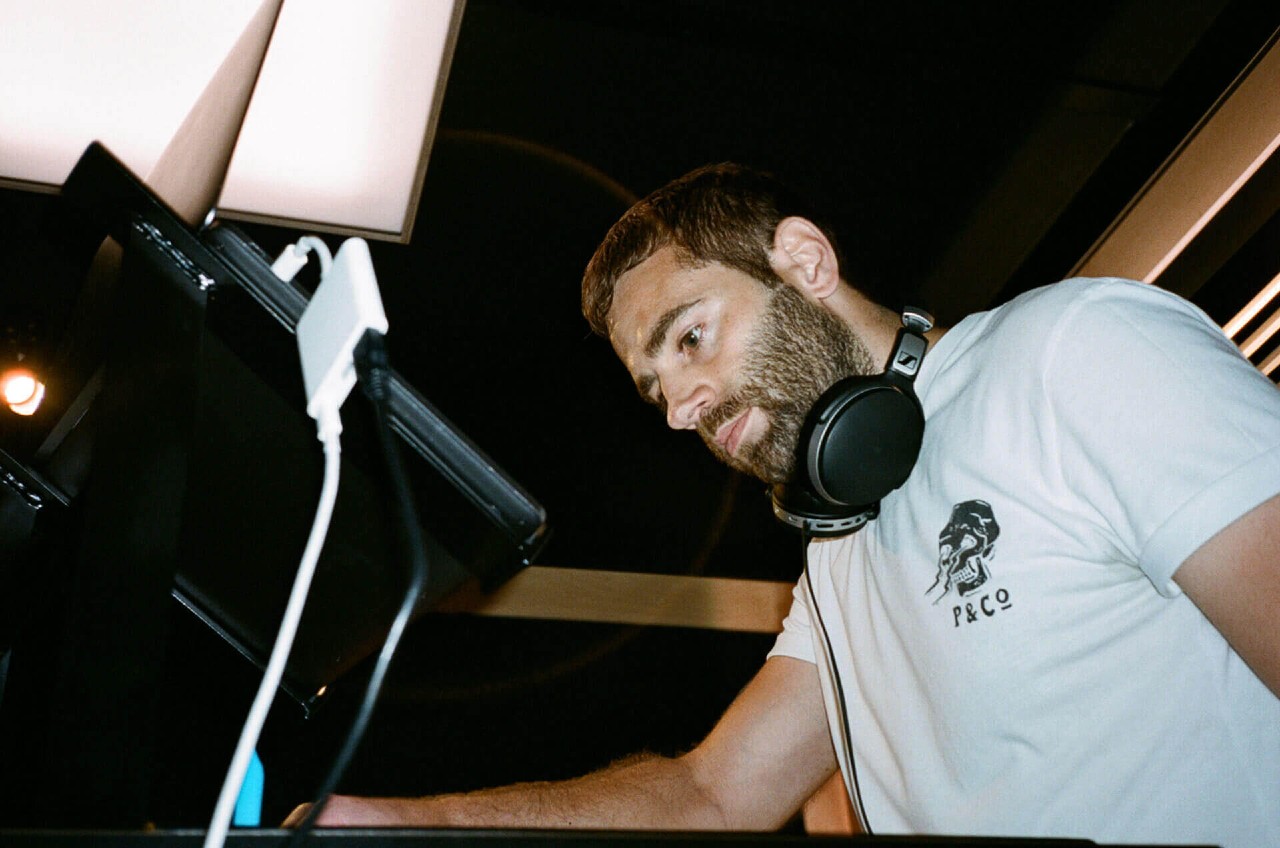
With your first DJ mix ready, you’re ready to start building a following and getting your name out there. The DJ community relies on friendship and collaboration, so the best thing you can do is get to know and start working with other DJs, as well as building your distinctive brand and style.
Part of building your brand means you will have to choose a DJ name, and eventually you’ll also have to learn how to write a DJ bio. These days, most DJs rely on social media to find their fanbase, especially Instagram and SoundCloud, but also Facebook, Twitter and TikTok. You can start by uploading your first mix to SoundCloud and sharing it with your friends on social media and work from there. Once you’re more comfortable recording mixes, try looking for a podcast series that matches your musical style and see if they are accepting submissions – this is the easiest way to expand your reach while starting out.
Before you go after your first club gig, it might be a good idea to cut your teeth at a few house parties or bars, where the stakes are lower. Look out for bars in your area with DJs that play your style of music and approach them – the gigs might not pay well, but they’ll be great for practice!
You can also try following local collectives, promoters, and venues that you like on social media and watch out for open calls. You can even try writing them directly, although you’ll need patience and perseverance, as it might take a while before you get a positive – or indeed any – response.
The most important thing is to be an active part of your scene and get to know people organically. You can even gather some like minded people to form a collective, hire a small space and throw your own party! This is the easiest (although perhaps more financially risky) way to start playing out more.
Once you have your first gig offer, you might be wondering how much a beginner DJ should charge. Although many beginners start by playing for free, DJing even while still learning is work that requires preparation and an investment in music and equipment, so do deserve to be paid, and you should do your best to negotiate a fee, even a low one.
Hopefully you now have an overview on how to start DJing, what equipment you’ll need, what skills you should start learning, and where this could all take you. Remember, the most important thing is to know your music well, play music you love, practice lots, and network with other people in your scene. If you can manage that while learning to DJ, you’re well set up to build your brand, get your first gig and be on the way to success.
